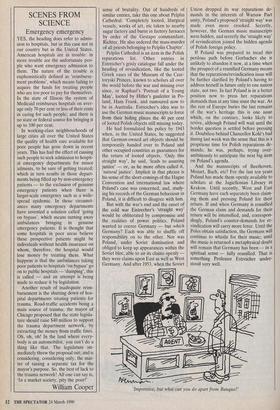SCENES FROM SCIENCE
Emergency emergency
YES, the heading does refer to admis- sion to hospitals, but in this case not in our country but in the United States. American hospitals are in trouble: in more trouble are the unfortunate peo- ple who want emergency admission to them. The nature of the trouble is euphemistically defined as 'reimburse- ment problems', which means failing to acquire the funds for treating people who are too poor to pay for themSelves. In the state of Illinois the system of Medicaid reimburses hospitals on aver- age only 70 per cent or less of their costs in caring for such people; and there is no state or federal source for bringing it up to 100 per cent.
In working-class neighbourhoods of large cities all over the United States the quality of health care available for poor people has gone down in recent years. This has had the effect of causing such people to seek admission to hospit- al emergency departments for minor ailments, to be sure of getting treated; which in turn results in those depart- ments being filled up by non-emergency patients — to the exclusion of genuine emergency patients when there is larger-scale emergency such as a wide- spread epidemic. In those circumst- ances many emergency departments have invented a solution called 'going on bypass', which means turning away ambulances bringing in genuine emergency patients. It is thought that some hospitals in poor areas believe these prospective patients might be individuals without health insurance on whom, therefore, the hospital would lose money by treating them. What happens is that the ambulances taking poor patients to hospitals 'on bypass' go on to public hospitals — 'dumping', this is called — and an attempt is being made to reduce it by legislation.
Another result of inadequate reim- bursement is the shutting down of hos- pital departments treating patients for trauma. Road-traffic accidents being a main source of trauma; the mayor of Chicago proposed that the state legisla- ture should raise $40 million to support the trauma department network, by extracting the money froth traffic fines. Oh, oh, oh! In the land where every- body is an automobilist, you can't do a thing like that. The legislature im- mediately threw the proposal out; and is considering, considering only, the mat- ter of raising a separate tax for the mayor's purpose. So, the best of luck to the trauma network! All one can say is, `In a market society, pity the poor!'
William Cooper


















































 Previous page
Previous page